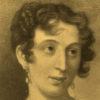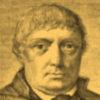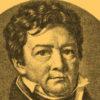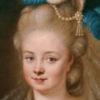Xenophon (ca. 430–354 BCE): Greek historian, pupil of Socrates, soldier under Cyrus the Younger against Artaxerxes II of Persia; Xenophon’s history of the campaign and journey home is the Anabasis, a piece Alexander the Great subsequently used as a guide for his own campaigns into Persia and the language of which made it a frequent choice for beginning students of Greek, whence perhaps Friedrich thought Xenophon’s Cyropaedia (“education of Cyrus”) might be useful for Auguste. The Cyropaedia is a partly fictional biography of Cyrus the Great that addresses the notion of the ideal ruler and despot. It is sometimes called the first novel in Western literature, since it prompted a fashion for such biographies; the increasing use of fictional elements arguably eventually generated the new genre of the novel.
Young, Edward (1683–1765): English writer. Although Young wrote in several genres, including successful plays and poetry, he is best known for his Complaint: or Night-Thoughts on Life, Death and Immortality published in nine parts between 1742 and 1745 (commonly known as Night Thoughts) in which he reflects on the loss of his wife in 1740 and others, and on human frailty. The piece was enormously successful both in England and on the continent. Goethe alleged not only that he engaged the work of Young and Milton to help him learn English, but also that the success of the Night Thoughts in Germany helped contribute to the atmosphere prompting the considerable and emotional response to his early work, Die Leiden des jungen Werthers (Leipzig 1774).
Ysenburg, Friedrich von (3 January 1787–1 October 1856): Bavarian general major; youngest son of Würzburg town commandant Georg August von Ysenburg, younger brother of Wilhelm Christoph von Ysenburg. From 25 April 1826 married to Maria Anna, née Suppus (born 14 December 1786).
Ysenburg, Georg August von (1741–1822): Bavarian general who on 2 June 1802 occupied Würzburg and assumed control of the Franconian troops. From 27 September 1805 governor in Würzburg and the Fortress Marienberg. After the loss of Würzburg in 1806 he took over command of the Franconian troops from Bamberg. Retired in 1811.
Ysenburg , Wilhelm Christoph von (15 June 1782–29 February 1860): Bavarian infantry general major and brigadier. Eldest son of Würzburg town commandant Georg August von Ysenburg, elder brother of Friedrich von Ysenburg. From 20 December 1808 married to Countess Henriette Juliane Charlotte, née von Normann (born 26 March 1787).
Zapf, Herr (dates unknown): Wine merchant in Jena from whom Schiller and others had their wine delivered, though for finer wines they usually dealt with the wine dealers Fröhlich and Lange, and with the Ramann brothers in Erfurt.
Zelter, Juliane (Julie), née Pappritz (†17 [or 16] March 1806): Younger daughter of a Berlin finance minister, from 1796 wife of Karl Friedrich Zelter, with whom she had eleven children. She assisted Zelter with his vocal academy, she herself being an excellent singer who allegedly “sang like an angel” (Allgemeine musikalische Zeitung 16 [1814] 52 [28 December 1814] 880).
 Zelter, Karl Friedrich (1758–1822): Composer, musician, music pedagogue, conductor, from 1796 married to Juliane (Julie), née Pappritz. Originally trained as a mason in Berlin (from 1783 professionally), Zelter trained then as a musician and composer, debuting in 1786 with a requiem in Potsdam on the death of Frederick the Great. From 1791 member of the Berlin Vocal Academy under C. F. C. Fasch, taking over as head in 1800. From 1809 professor at the Royal Academy of the Arts, later also founding the Royal Institute for Church Music and the conservatory at the university in Berlin and holding various other posts. Considerably influenced the public cultivation of music in Germany. Composed over two hundred Lieder as well, including many by Goethe, who found Zelter’s compositions more appropriate to his poems than those of other composers. The two men carried on an extensive correspondence, which was later published. (Portrait: in Gustav Könnecke, Bilderatlas zur Geschichte der deutschen Nationallitteratur, 2nd ed. [Marburg 1895], 292.)
Zelter, Karl Friedrich (1758–1822): Composer, musician, music pedagogue, conductor, from 1796 married to Juliane (Julie), née Pappritz. Originally trained as a mason in Berlin (from 1783 professionally), Zelter trained then as a musician and composer, debuting in 1786 with a requiem in Potsdam on the death of Frederick the Great. From 1791 member of the Berlin Vocal Academy under C. F. C. Fasch, taking over as head in 1800. From 1809 professor at the Royal Academy of the Arts, later also founding the Royal Institute for Church Music and the conservatory at the university in Berlin and holding various other posts. Considerably influenced the public cultivation of music in Germany. Composed over two hundred Lieder as well, including many by Goethe, who found Zelter’s compositions more appropriate to his poems than those of other composers. The two men carried on an extensive correspondence, which was later published. (Portrait: in Gustav Könnecke, Bilderatlas zur Geschichte der deutschen Nationallitteratur, 2nd ed. [Marburg 1895], 292.)
 Zentner, Georg Friedrich von (1752–1835): Bavarian statesman, legal scholar. Jesuit-educated in Heidelberg and France during his early years, studied public law and history in Göttingen. From 1779 professor of international law and imperial history in Heidelberg, also participating as a consultant during the negotiations in Basel in 1795 and Rastatt in 1797. From 1799 till 1817, as ministerial privy counselor in Munich, essentially the director of all education and instruction in Bavaria, including the universities; from 1819 general director in the new ministry of the interior in Munich; from 1823 Bavarian minister of justice. (Portrait: possibly by Joseph Karl Stieler; München, Staatliche Graphische Sammlung, Inventar-Nr. 248765.)
Zentner, Georg Friedrich von (1752–1835): Bavarian statesman, legal scholar. Jesuit-educated in Heidelberg and France during his early years, studied public law and history in Göttingen. From 1779 professor of international law and imperial history in Heidelberg, also participating as a consultant during the negotiations in Basel in 1795 and Rastatt in 1797. From 1799 till 1817, as ministerial privy counselor in Munich, essentially the director of all education and instruction in Bavaria, including the universities; from 1819 general director in the new ministry of the interior in Munich; from 1823 Bavarian minister of justice. (Portrait: possibly by Joseph Karl Stieler; München, Staatliche Graphische Sammlung, Inventar-Nr. 248765.)
Ziegesar, August Friedrich Karl (Carl) von (1746–1813), and his wife Magdalene Auguste, née von Wangenheim (1751–1809): Family in Drakendorf near Jena. From 1766 the father occupied various administrative positions in the duchy of Sachsen-Gotha (as did his father before him), including those of Geheimer Rath and Kanzler. Began law study in Jena at fifteen, earning his doctorate in 1765, thereafter taking an administrative position at the court in Gotha, where he quickly advanced and was an enormously successful and effective administrator. He retired to his estate Drakendorf in 1808 but was quickly (1809) enlisted in the Weimar administration as well, including with respect to certain issues at the university in Jena. Goethe was a close family acquaintance.
 Ziegesar, Sylvie (1785–1853[55?]): Daughter of August Friedrich Karl von Ziegesar. In Jena Sylvie became friends not only with Pauline Gotter, but also with the painter Louise Seidler. It was in the early summer of 1808 that Goethe socialized extensively with Sylvie and Pauline at the mineral springs in Karlsbad (see his poem “An Sylvie von Ziegesar”), eventually serving as godfather to her child after her marriage. Certain features of the character Ottilie in Goethes novel Wahlverwandtschaften allegedly derive from her. (Portrait by Louise Seidler; Goethe-Nationalmuseum.)
Ziegesar, Sylvie (1785–1853[55?]): Daughter of August Friedrich Karl von Ziegesar. In Jena Sylvie became friends not only with Pauline Gotter, but also with the painter Louise Seidler. It was in the early summer of 1808 that Goethe socialized extensively with Sylvie and Pauline at the mineral springs in Karlsbad (see his poem “An Sylvie von Ziegesar”), eventually serving as godfather to her child after her marriage. Certain features of the character Ottilie in Goethes novel Wahlverwandtschaften allegedly derive from her. (Portrait by Louise Seidler; Goethe-Nationalmuseum.)
Ziehen, Conrad Siegmund (1727–1780): Protestant theologian, from 1763 superintendent in Hannoversch-Münden, from 1769 pastor in Zellerfeld. He died (1780) just before Caroline and Franz Wilhelm Böhmer married (1784) and moved to Clausthal, the sister village to Zellerfeld. His widow published his Kabbalah-influenced prophecies of the end of the world and of various earthquakes and global catastrophes after his death.
Zimmer, Johann Georg (11 January 1777–6 February 1853): Heidelberg bookseller (though lived elsewhere as well) who corresponded with several writers associated with German Romanticism, including Achim von Arnim, Clemens Brentano, Joseph von Görres, Wilhelm and Friedrich Schlegel, Ludwig Tieck, F. C. Savigny, and Jean Paul. Zimmer later, even though he already had a wife and children, set about learning the ancient languages, studied theology, and worked as a pastor for 38 years.
 Zimmer, Patritius Benedict (1752–1820): Catholic Bavarian theologian, from 1783 professor of systematic theology in Dillingen, closely associated with the theology professor Johann Michael Sailer and the philosopher and natural scientist Joseph von Weber, all of whom were opposed by the Jesuits. From 1799 professor in Ingolstadt and Landshut, though he also continued his pastoral work in Steinheim. Ardent follower of Schelling’s philosophy, and an opponent of Kantianism. (Portrait: frontispiece to J. M. Sailer and J. Widmer, Patritius Benedictus Zimmer’s kurzgefaßte Biographie und ausführliche Darstellung seiner Wissenschaft [Landshut 1822].)
Zimmer, Patritius Benedict (1752–1820): Catholic Bavarian theologian, from 1783 professor of systematic theology in Dillingen, closely associated with the theology professor Johann Michael Sailer and the philosopher and natural scientist Joseph von Weber, all of whom were opposed by the Jesuits. From 1799 professor in Ingolstadt and Landshut, though he also continued his pastoral work in Steinheim. Ardent follower of Schelling’s philosophy, and an opponent of Kantianism. (Portrait: frontispiece to J. M. Sailer and J. Widmer, Patritius Benedictus Zimmer’s kurzgefaßte Biographie und ausführliche Darstellung seiner Wissenschaft [Landshut 1822].)
 Zimmermann, Johann Georg (1728–95): Physician, philosopher. From 1742 studied in Bern, from 1747 in Göttingen (medicine), earning his doctorate in 1751. From 1752 practicing physician in Bern, from 1754 in Brugg. From 1768 appointed “his Britannic Majesty’s Physician” (personal physician to the king) in Hannover in 1768, where he built up a successful practice. Attended Friedrich II during the latter’s final illness. Beset by insanity later in life. Best known as a popularizer of current philosophical and ethical ideas, also encouraged medical writing in German instead of Latin. (Portrait: by J.E. Haid.)
Zimmermann, Johann Georg (1728–95): Physician, philosopher. From 1742 studied in Bern, from 1747 in Göttingen (medicine), earning his doctorate in 1751. From 1752 practicing physician in Bern, from 1754 in Brugg. From 1768 appointed “his Britannic Majesty’s Physician” (personal physician to the king) in Hannover in 1768, where he built up a successful practice. Attended Friedrich II during the latter’s final illness. Beset by insanity later in life. Best known as a popularizer of current philosophical and ethical ideas, also encouraged medical writing in German instead of Latin. (Portrait: by J.E. Haid.)
 Zirkel, Gregorius (Gregor) von (2 August 1762–18 December 1817): Suffragen bishop of Würzburg. Studied at the Catholic seminary in Würzburg beginning in 1781, ordained a priest in 1786, from 1789 taught at the Catholic theological seminary in Würzburg, 1791 attained his doctorate, from 1795 professor at the university in Würzburg, from 1797 till 1809 full professor, from 1789 till 1797 subrector, from 1799 till 1802 rector of the Catholic seminary as well. Consecrated as bishop on 28 October 1802; after the death of Georg Karl Ignaz von Fechenbach in 1808, Zirkel carried on the episcopal affairs himself during the Sede vacante. Close colleague of Franz Berg in Würzburg. Opposed the measures taken by the Bavarian administration in Würzburg with respect to the university and Catholic seminary and led the “recatholicizing” of these institutions after 1814, when Würzburg again became a Bavarian territory. On 25 October 1817 became first bishop of Speyer but died before papal confirmation. (Portrait: unknown artist, pastel, ca. 1810.)
Zirkel, Gregorius (Gregor) von (2 August 1762–18 December 1817): Suffragen bishop of Würzburg. Studied at the Catholic seminary in Würzburg beginning in 1781, ordained a priest in 1786, from 1789 taught at the Catholic theological seminary in Würzburg, 1791 attained his doctorate, from 1795 professor at the university in Würzburg, from 1797 till 1809 full professor, from 1789 till 1797 subrector, from 1799 till 1802 rector of the Catholic seminary as well. Consecrated as bishop on 28 October 1802; after the death of Georg Karl Ignaz von Fechenbach in 1808, Zirkel carried on the episcopal affairs himself during the Sede vacante. Close colleague of Franz Berg in Würzburg. Opposed the measures taken by the Bavarian administration in Würzburg with respect to the university and Catholic seminary and led the “recatholicizing” of these institutions after 1814, when Würzburg again became a Bavarian territory. On 25 October 1817 became first bishop of Speyer but died before papal confirmation. (Portrait: unknown artist, pastel, ca. 1810.)
Zöllner, Johann Friedrich (1753–1804): Enlightenment theologian and educational reformer. Author of the footnote query “What is Enlightenment” to which, among others, Kant replied. Studied theology in Frankfurt/Oder, from 1779 pastor in Berlin, from 1782 deacon ultimately pastor at the Church of St. Mary, from 1788 provost of the Church of St. Nikolas, and member of the high consistory. From 1800 member of the body overseeing secondary schools in Prussia. Opposed much of the reform imposed by Johann Christoph Wöllner. Contributed extensively to adult education through ongoing publications and to spreading the ideals of the Enlightenment among the populace at large, also advocated a reform of the broader educational system. A member of the Wednesday Society and regular contributor to the Berlinische Monatsschrift.
 Zschokke, Heinrich (1771–1848): Writer, pedagogue, politician. From 1788 member of an itinerant theater company, for which he wrote plays. One particularly successful one was the stage adaptation of his own novel, Abällino, der grosse Bandit (Frankfurt, Leipzig 1794). From 1790 studied theology in Frankfurt/Oder, earning his doctorate and thereafter working as a lecturer, from 1795 in Switzerland, where he remained as a successful pedagogue, political journalist, and writer. Portrait: in Gustav Könnecke, Bilderatlas zur Geschichte der deutschen Nationallitteratur, 2nd ed. [Marburg 1895], 363.)
Zschokke, Heinrich (1771–1848): Writer, pedagogue, politician. From 1788 member of an itinerant theater company, for which he wrote plays. One particularly successful one was the stage adaptation of his own novel, Abällino, der grosse Bandit (Frankfurt, Leipzig 1794). From 1790 studied theology in Frankfurt/Oder, earning his doctorate and thereafter working as a lecturer, from 1795 in Switzerland, where he remained as a successful pedagogue, political journalist, and writer. Portrait: in Gustav Könnecke, Bilderatlas zur Geschichte der deutschen Nationallitteratur, 2nd ed. [Marburg 1895], 363.)
Zumsteeg, Johann Rudolf (1760–1802): Composer. From 1770 a pupil at the Hohe Karlschule in Stuttgart, where he became good friends with Schiller; although he was initially to study sculpture, his obvious musical talent soon prompted a change. From 1781 cellist with the court orchestra in Stuttgart, later became a teacher at the Hohe Karlschule. From 1791 music director at the royal theater there, later also court music director. Prolific composer, including operas and choral music, though also influenced the development of the narrative and dramatic ballad (e.g., Franz Schubert); it is presumed that Schiller’s own ballades prompted him to begin composing them himself.
 [Zweibrücken] Maria Amalie Auguste von Zweibrücken-Birkenfeld-Bischweiler (1752–1828). From 29 January 1769 wife of Friedrich August III of Saxony. (Anonymous portrait in oil.)
[Zweibrücken] Maria Amalie Auguste von Zweibrücken-Birkenfeld-Bischweiler (1752–1828). From 29 January 1769 wife of Friedrich August III of Saxony. (Anonymous portrait in oil.)
